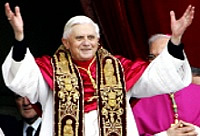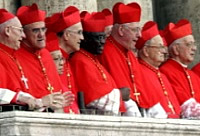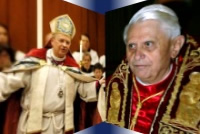

Pope Benedict XVI
What Does it Mean
for the Church and the World?
On Tuesday April 19, 2005 at 6:43 p.m. (12:43 p.m. Eastern) the Proto-Deacon of the College of Cardinals, Jorge Arturo Cardinal Madina Estevez appeared on the Loggia of St Peters Basilica and announced that 78 year old Joseph Cardinal Ratzinger of Germany, had been elected Supreme Pontiff of the Roman Catholic Church and its one billion adherents.
“Dear brothers and sisters. I announce to you a great joy. We have a Pope. The Most Eminent and Most Reverend Lord, Lord Joseph, Cardinal of the Holy Roman Church, Ratzinger, who has taken the name Benedict XVI.”
Then At 6:48 p.m. Joseph Cardinal Ratzinger, preceded by a cross, stepped forward as Pope Benedict XVI to greet thousands of people in Vatican square and to impart the Apostolic Blessing “Urbi et Orbi” (to the city and to the world). However, before doing so he offered the following:
“Dear brothers and sisters. After the great Pope John Paul II, the Cardinals have elected me, a simple and humble laborer in the vineyard of the Lord.
The fact that the Lord knows how to work and to act even with inadequate instruments comforts me. And above all, I entrust myself to your prayers.
Let us move forward in the joy of the Risen Lord, confidant of His unfailing help. The Lord will help us and Mary His Most Holy Mother, will be on our side. Thank you.”
Ratzinger was chosen on the fourth ballot and is the oldest elected pope since Clement XII, who was chosen in 1730. He is the first German to hold the position since the 11th century.
Although he is highly regarded as a scholar within the church, his views with respect to contemporary morals are considered to be very conservative. This has caused some concern in the more liberal Catholic circles of Western Europe and the United States. He served John Paul II since 1981 as head of the Congregation for the Doctrine of the Faith. In that position, he was responsible for the discipline of church dissidents and for upholding church policy against attempts by liberals for reforms.
Some have noticed signs of a more conciliatory tone in the new Pontiff, however, it is highly unlikely the church will be modifying its stance on many of the issues that polarize millions within and outside the church. Actually the opposite is more likely. When speaking of the challenge ahead of him, the Pope warned that his primary role “was not to present a program of governance to the Church and to pursue his own ideas, but [rather] to listen to the will of God and be guided by it.”
Pope Benedict XVI has taken many positions similar to his predecessor, John Paul II, and has long been a staunch defender of Catholic doctrine. Additionally, he has made it very clear that he intends to maintain traditions, and not give in to modern pressures to change fundamental Church dogma and teaching on such issues as birth control, abortion, and homosexuality. Furthermore, the Pontiff maintains the Church's opposition to moral relativism, which he sees as producing views ranging "from one extreme to the other.” This opposition became clear in the last official addresses prior to his election. As the powerful dean of the College of Cardinals, he used his homily at the Mass dedicated to electing the next pope to warn the faithful about tendencies that he considered dangers to the faith: including the ideology that there are no absolute truths.
“Having a clear faith, based on the creed of the church, is often labeled today as a fundamentalism,” he said. “We are moving towards a dictatorship of relativism, which does not recognize anything as definitive and has as its highest value one’s own ego and one’s own desires.”
The Pope’s ecclesiology places great emphasis on the institutions of the Catholic Church as the instrument by which God's message manifests itself on Earth: a view of the Church's role which tends to resist pressure to submit to external social trends. As such, he does not view the search for moral truth as a dialectic and incremental process, arguing that essential matters of faith and morals must be determined at the universal level. In other words, morality relies on God as its source, not man.
The Popes commitment to traditional values has even gained friends in many Fundamentalist Christian churches—something that would well be worth watching. In the past Ratzinger has referred to homosexuality as “intrinsically evil,” and rejected the idea that contraceptives should be viewed as a safeguard against the transmission of STDs. He actually stated that contraception for the purpose of avoiding AIDS would “facilitate evil.”
Ratzinger’s position on abortion is equally uncompromising. He even brought it into the US presidential election between Senator John Kerry and President George W. Bush. He stated that voters would be "cooperating in evil" if they voted for a political candidate who supported legalized abortion or euthanasia.
This page of our website is dedicated to following the journey of Pope Benedict XVI and the Mother Church.
 Print
Print


